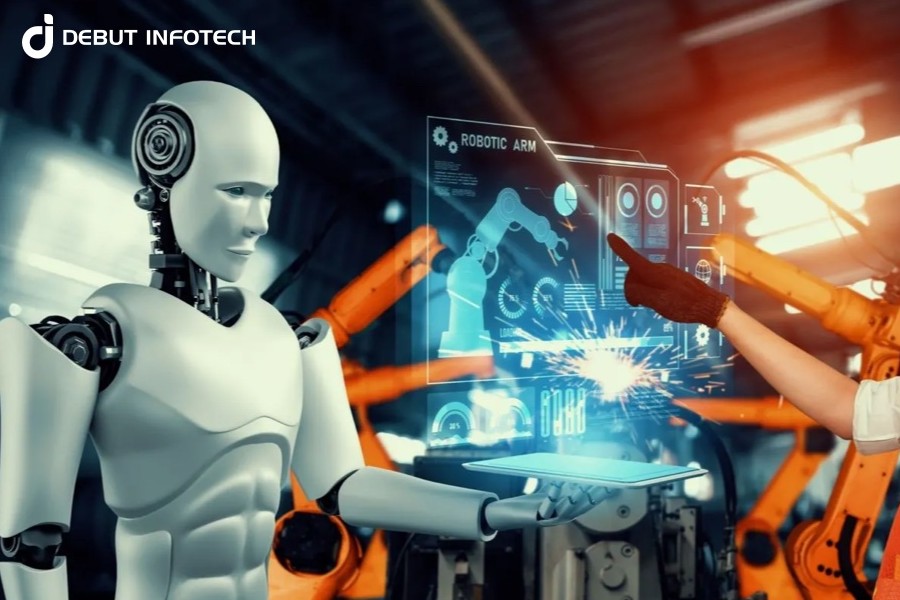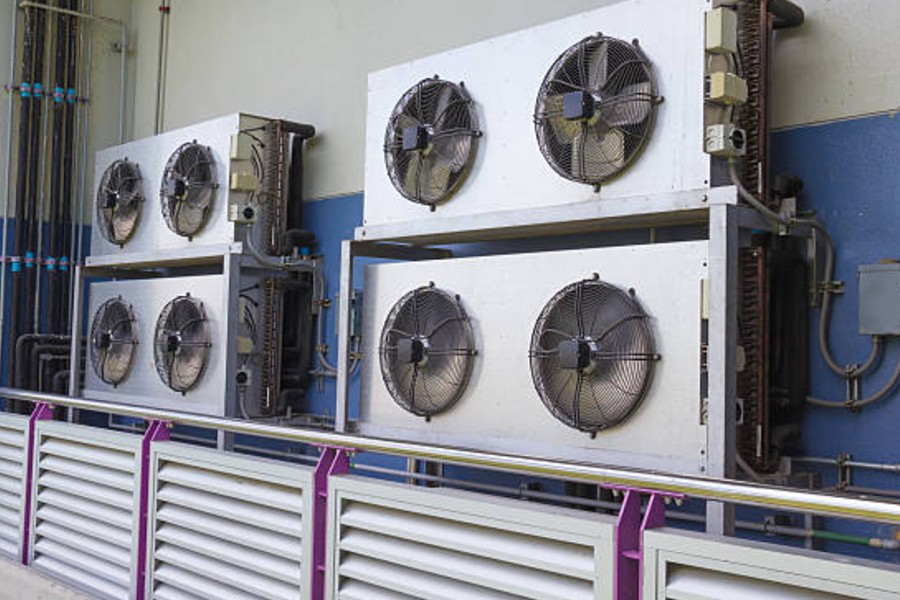
By HWM
The manufacturing sector is undergoing transformation, thanks to Artificial Intelligence (AI).
Implementing AI in manufacturing offers a blend of efficiency and innovation while also cutting down costs effectively. The advancements in AI technology are significantly shaping the manufacturing industry.
As per a report by Accenture, AI adoption in manufacturing could generate up to $3.8 trillion in value annually by 2035. By automating complex tasks and enhancing decision-making processes, AI is transforming how factories operate, from predictive maintenance to quality control and supply chain management.
This article explores the key AI applications in manufacturing, the advanced technologies powering this revolution, the benefits AI brings to manufacturers, and real-life examples of companies leveraging AI to stay competitive. We’ll also address the challenges companies face when dealing with how to use AI in manufacturing.
What is AI in Manufacturing?
Artificial Intelligence (AI) in manufacturing is the application of cutting-edge technologies, such as robotics, data analytics, and machine learning, to streamline and enhance the production process.
By enabling machines to perform tasks that often require human intelligence, AI is transforming the manufacturing landscape. It allows for the automation of complex operations, improving decision-making capabilities, and fostering innovations in areas like predictive maintenance and quality control. This increases efficiency, reduces operational costs, and the ability to scale production while maintaining high-quality standards.
As the industry is driven by precision and productivity, AI is proving indispensable for staying competitive in the global market with the help of AI development services.
How is AI Used in Manufacturing Industry?
Here are some applications of AI in manufacturing industry:
1. Predictive Maintenance
AI plays a vital role in predictive maintenance by analyzing real-time data from equipment and predicting when maintenance should be performed. This proactive approach prevents unexpected breakdowns, reduces downtime, and extends the life of machinery. Sensors collect data on temperature, vibration, and performance, which AI uses to forecast potential issues before they escalate.
2. Automated Quality Control
AI-powered vision systems inspect products for defects in real time during production. By means of image recognition and machine learning algorithms, AI can detect even the slightest variations or imperfections in products, ensuring that only high-quality goods are delivered. This reduces waste and minimizes the cost of post-production inspections.
3. Robotic Process Automation (RPA)
Robotic Process Automation is among one of the uses of AI in manufacturing. Robots are equipped with AI capabilities to handle repetitive and complex tasks such as welding, painting, and assembly. AI-driven robots work faster and more accurately than human workers, especially for tasks requiring precision. This improves production speed and enhances product quality and worker safety.
4. Supply Chain Optimization
AI solutions for manufacturing help in optimizing supply chains by predicting demand, managing inventory, and streamlining logistics. Machine learning algorithms analyze historical sales data, current market trends, and logistical constraints to forecast demand and adjust production schedules accordingly, ensuring timely deliveries and reducing stock shortages or overproduction.
5. Production Line Optimization
AI systems continuously analyze the production line to optimize workflows. By identifying bottlenecks, AI can suggest adjustments to the process, enhancing overall efficiency. This ensures that resources such as labor and materials are used effectively, maximizing productivity without increasing costs.
6. Energy Management
AI manufacturing solutions optimize energy consumption by analyzing energy usage patterns and identifying areas where resources can be conserved. This is particularly beneficial in energy-intensive industries such as metalworking or chemical production, where reducing power consumption directly impacts operating expenses and carbon emissions.
Technologies Driving AI in Manufacturing
Here are some technologies driving AI in manufacturing:
1. Machine Learning (ML)
Machine Learning forms the backbone of Artificial intelligence in manufacturing industry. ML algorithms empower systems to learn from data, recognize patterns, and make informed decisions. In manufacturing, ML helps in predictive maintenance, supply chain management, and quality control by analyzing vast amounts of production data and improving operations over time.
2. Computer Vision
Computer Vision, a subset of AI, allows machines to interpret and understand visual information. It is widely used for quality control, where AI systems equipped with cameras inspect products for defects, and in autonomous robots that navigate factory floors. Computer vision ensures that products meet stringent quality standards without slowing down production.
3. Industrial Internet of Things (IIoT)
The IIoT connects devices, sensors, and machines across the factory floor, generating vast amounts of data that AI systems analyze to improve production processes. Manufacturers gain real-time insights into equipment performance, energy consumption, and operational efficiency by linking machinery to AI systems.
4. Natural Language Processing (NLP)
NLP allows AI systems to interpret and respond to human language. In manufacturing, NLP is used in customer support and maintenance operations. AI systems can understand spoken or written commands, troubleshoot issues, or assist in real time, enabling better interaction between machines and human operators.
Benefits of AI in Manufacturing
Here are some advantages of implementing AI in manufacturing:
1. Increased Efficiency
Have you ever wondered why companies are passionate about the use of AI in manufacturing industry?
AI enhances efficiency by automating complex and repetitive tasks, freeing human workers for more strategic roles. Automation leads to faster production cycles and streamlined workflows, allowing companies to meet production targets more easily and scale operations as needed.
This is one of the reasons why businesses are turning to generative AI development companies.
2. Reduced Downtime
Through predictive maintenance, AI minimizes equipment failures and production halts. This proactive approach reduces unplanned downtime, keeping machines running optimally and ensuring that production schedules stay on track.
3. Cost Reduction
AI reduces costs by optimizing resource usage, improving energy efficiency, and minimizing waste through accurate quality control. Predictive maintenance further lowers costs by preventing expensive repairs and extending the life of machinery.
Cost reduction is among the numerous benefits of AI in production that encourages businesses to hire AI developers.
4. Enhanced Decision-Making
AI-driven analytics provide managers with actionable insights based on real-time data. This data-driven approach allows for better decision-making in resource allocation, production scheduling, and inventory management.
5. Better Quality Control
AI’s ability to detect defects during production ensures that only top-quality products reach the market. By maintaining high-quality standards, manufacturers can reduce product recalls and enhance customer satisfaction.
6. Sustainability
AI optimizes energy consumption and material use, reducing waste and lowering environmental impact. This contributes to a company’s sustainability goals and aligns with regulatory requirements for greener manufacturing practices.
Sustainability is crucial for business growth and is one reason for integrating artificial intelligence in factories.
Real-Life Use Cases of AI in Manufacturing
Here are real-life AI use cases in manufacturing:
1. Siemens
Siemens is known for integrating artificial intelligence in its manufacturing processes for predictive maintenance. They use AI-driven systems to monitor equipment performance in real-time and leverage data analysis to forecast optimal maintenance schedules. This approach has notably decreased downtime and operational expenses in their facilities.
2. General Electric (GE)
GE utilizes AI in its Brilliant Manufacturing suite, which integrates AI to improve efficiency and optimize production processes. GE’s factories use machine learning algorithms to monitor equipment health and improve overall productivity, especially in the aviation and energy sectors.
3. BMW
BMW has integrated AI into its car production lines, particularly in quality control. AI systems visually inspect vehicles for any imperfections during the assembly process, ensuring that every car meets the highest quality standards before entering the market. This helps reduce the need for manual inspections and lowers the risk of product recalls.
4. Foxconn
As one of the largest electronics manufacturers, Foxconn uses AI to automate its assembly lines for products such as smartphones and tablets. AI-driven robots perform complex tasks with precision, while machine learning algorithms help improve production efficiency and reduce human error.
5. Tesla
Tesla’s factories leverage AI extensively for automation, from robotic arms assembling vehicles to AI-powered systems overseeing production quality. AI also helps Tesla with demand forecasting, ensuring its supply chain operates efficiently and meets customer demand without excess inventory.
Challenges of implementing AI in Manufacturing
Despite its many advantages, implementing AI in manufacturing comes with several challenges.
1. High Implementation Costs
Integrating AI into existing manufacturing systems can be expensive, especially for smaller companies. The cost of advanced AI technologies, along with the necessary infrastructure upgrades, can be a significant barrier to entry.
2. Data Security and Privacy
AI relies on massive amounts of data to function properly. However, ensuring the security and privacy of this data is a significant concern, particularly as more systems become interconnected. Breaches can lead to intellectual property theft or disruption of production processes.
3. Skill Gaps
AI requires specialized knowledge. Because of this, many manufacturing companies may struggle to find workers with the skills needed to operate and maintain AI systems. This creates a talent gap that can hinder the widespread implementation of AI.
4. Integration with Legacy Systems
Many manufacturers rely on older equipment and software systems. Integrating AI with these legacy systems can be difficult, as it often requires significant upgrades or replacements, leading to additional costs and complexity.
5. Resistance to Change
Some companies and workers may resist the adoption of AI due to concerns over job displacement or the fear of technology taking over traditional roles. Educating stakeholders on the collaborative nature of AI and its potential to create new job opportunities is essential to overcoming this resistance.
6. Regulatory Compliance
As AI becomes more prevalent in manufacturing, there are growing concerns about regulatory compliance, particularly in industries with strict quality and safety standards. Ensuring that AI systems adhere to these regulations can be a complex and time-consuming process.
Overcoming these challenges requires a strategic approach, balancing the initial investment with the long-term gains AI promises in efficiency, cost savings, and innovation.
Conclusion
Implementing AI in manufacturing will transform the industry by boosting efficiency and precision while fostering innovation. Companies can optimize their workflows effectively and cut down costs by improving predictive maintenance, automated quality control, and energy management.
Technologies such as machine learning, computer vision, and IIoT influence this transformation, enabling manufacturers to remain competitive in an increasingly changing market.
Debut Infotech is a top-rated AI development company, specializing in transforming manufacturing and other industries. With cutting-edge AI solutions, Debut Infotech can guide you on how to incorporate AI into your business. They help to streamline operations, improve productivity, and enhance quality control through predictive maintenance, robotic automation, and data-driven decision-making.
Their expertise in integrating AI with industrial systems ensures optimized workflows, reduced downtime, and significant cost savings. By leveraging advanced technologies such as machine learning and IoT, Debut Infotech empowers manufacturing businesses to stay competitive and embrace the future of intelligent production.
Become a Harlem Insider!
By submitting this form, you are consenting to receive marketing emails from: . You can revoke your consent to receive emails at any time by using the SafeUnsubscribe® link, found at the bottom of every email. Emails are serviced by Constant Contact








